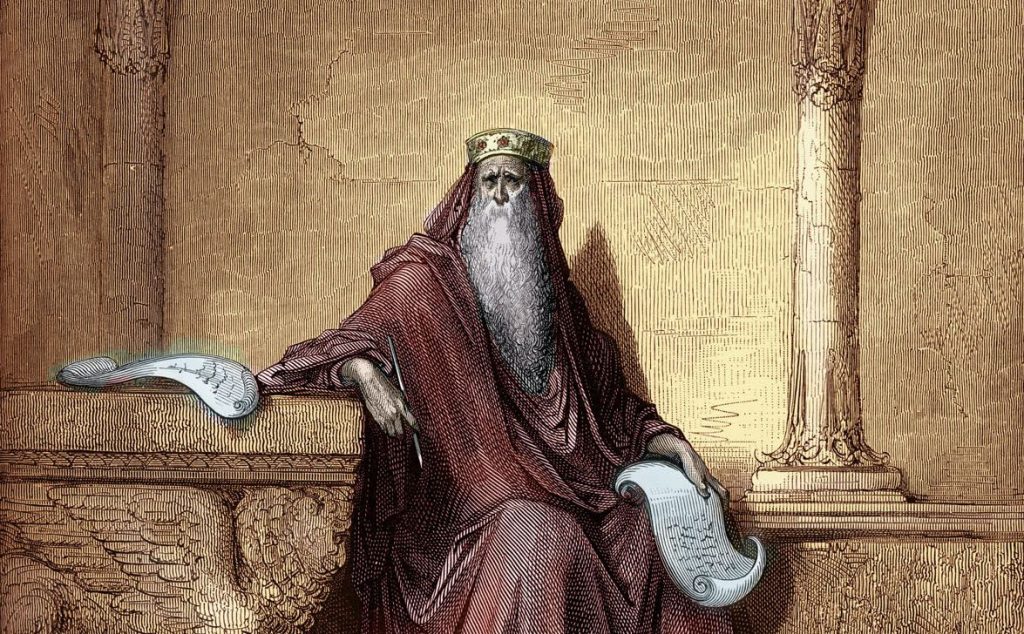How do we not lose hope with so much evil, injustice, and uncertainty in the world around us? How does a person not become cynical or grow weary of life itself, when surrounded with such caustic and toxic social unrest and divisiveness?
The great King Solomon, once considered the wisest man in the world, struggled with these same questions (1 Kings 4:29-31; 10:6-7). They seemed to plague him in his later years of life.
Solomon’s life was one of success and excess. It was also a life of foolishness along with wisdom because he didn’t heed all his own wise sayings nor the warnings of the Lord and the Covenant Law.
Many people who have read or tried to read through Ecclesiastes find it a difficult and discouraging book. It seems to pose more dilemmas and questions rather than provide resolve or answers. These are the words of the spokesman, the son of David, and the king in Jerusalem. “Absolutely pointless!” says the spokesman. “Absolutely pointless! Everything is pointless.” (Eccl 1:1-2 GW) A careful and thoughtful reading of Ecclesiastes should help with answering the question—Is life pointless or purposeful?
Insights
When reading Ecclesiastes, we need to keep in mind an ancient worldview 3,000 years removed from our present worldview. If you try to frame what’s written from a 21st-century viewpoint, it becomes difficult to wade through all of Solomon’s observations, thoughts, and quandaries.
Ecclesiastes is one of five books collected as poetic and wisdom books in the English canon of the Bible. Along with Job and Proverbs, it is considered a book of wisdom. But in the Hebrew Bible, it is part of what’s called the Writings, which include several books after the books of the Law and Prophets.
What Solomon says makes more sense if you consider how the world appeared in his day.
It’s written in an ancient form with a foil—a seemingly unsolvable puzzle is revealed in the end. Glimpses of what is revealed in the end as a conclusion are scattered throughout the book.
The book is titled Ecclesiastes. Ecclesiastes is the anglicized Greek word for the original word in Hebrew–Qohelet, which means assembler. It’s a term used for a teacher or preacher who calls people to assemble and speaks a message of wisdom to them.
But it could have several different titles like—the Preacher, Teacher, Spokesman (as in GW), Kohelet, Philosopher, or the literal– Leader of the assembly.
A few common words and phrases are repeated throughout the book, such as “under the sun,” “trying to catch the wind,” and “wisdom.” These words and phrases are worded differently in various Bible versions, but the essence is the same. God is mentioned forty times.
By far, one word stands out the loudest and is repeated three times alone in verse 2—pointless. The Hebrew word is hebel. It means breath or vapor but is translated in English Bible versions in many ways—pointless, meaningless, vanity, futility, useless.
This word is metaphorical for how fragile and temporary life seems.
This is the undergirding theme of the whole book but is not the final word, although it’s repeated at the end as in the beginning (Eccl 1;2; 12:8).
Another way of saying it is—”vapor, vapor… vapor of vapor”—everything on earth and in life is just a vapor.
Ecclesiastes seems to be Solomon’s philosophical reflections towards the end of his life. He questions the value and purpose of all he did. This is not existential philosophy in an academic sense, but it reflects Solomon’s questions and quandaries about life. In particular, his own learning and life experiences.
Throughout the book, you find many contradictory thoughts and even some that don’t fit the Christian theological narrative. There’s good reason for this. Solomon was viewing life “under the sun.” In other words, his view is earthbound as it is for most people without the hope of resurrection.
And yet, the Preacher speaks often of God and even of the fear of the Lord (Eccl 3:14; 4:7; 7:18; 8:12; 12:13). Keep that in mind as you read through the book and know that Solomon is building up to an important exhortation at the end.
When you read it the first time, do it all in one sitting without stopping to ponder things. This will help you keep the whole view and purpose of the book. This is one book where it may be helpful to read the ending before you dive in to study it.
Trip planted a church in the US and established two ministries overseas, along with many other ministry experiences. His ministry now focuses on discipleship and leadership development, while serving as a mentor to pastors and leaders with Poimen Ministries. Along with writing devotionals and simple Bible studies, he’s written books, Bible study guides, and training materials. Trip’s material can also be found at
@tkbeyond (on X)
@tripkimball (on https://substack.com/)





This Truth is certainly worth contemplating,, as the riots errupt in the U K, and trouble aroung the earth’s countries, increase, at a great speed, we need to find a place of solace in the Word of God.
Thanks for the realistic write up, and Godbless, your efforts.
Mrs Juanita A.
Thanks for reading and responding, Juanita!